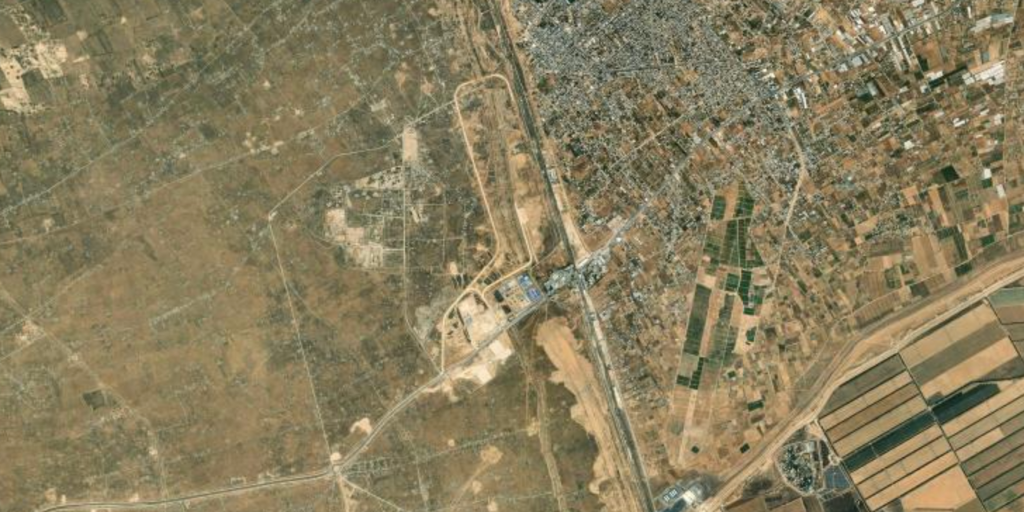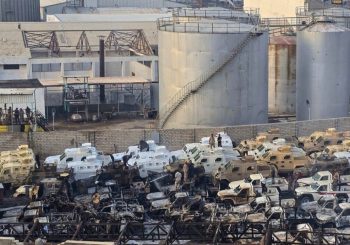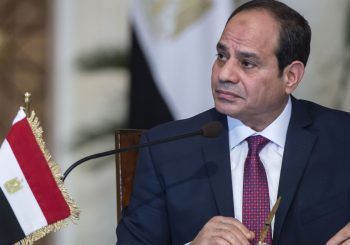Egypt’s North Sinai governorate refuted reports surrounding the establishment of a refugee camp near the Rafah border with Gaza in a website press release on 17 February.
The report, first circulated by the Wall Street Journal, showcases satellite imagery of recent construction along the Egyptian side of the Rafah border amid concerns over an Israeli offensive that forces a refugee crisis.
The article also claimed that the construction zone could accommodate around 100,000 Palestinian refugees.
The North Sinai governorate’s statement clarified that the ongoing land construction is intended to create a new logistics zone for managing incoming humanitarian relief.
“[Governor Mohamed Shusha] noted that it is the armed forces that are constructing the logistics area in Rafah to ease burdens on drivers and congestion in Arish and roads, as well as facilitating the work of the Egyptian Red Crescent,” the governorate’s statement said.
Egypt’s Chairman of the State Information Service (SIS) refuted claims of a refugee camp construction in a statement on the SIS’s Facebook page.
“[Egypt’s government] rejects any forced or voluntary displacement of our Palestinian brothers from the Gaza Strip to outside it, especially to Egyptian lands as it would certainly lead to the liquidation of the Palestinian cause,” Rashwan was quoted saying in the statement.
Egypt’s Minister of Foreign Affairs Sameh Shoukry highlighted that the government is preparing “for all scenarios, but this is not an encouragement for displacement,” during a session with other diplomatic counterparts at the Munich Security Conference on 17 February.
Shoukry also warned that any military operation in Rafah threatens Egypt’s national security.
Since the outset of the war on Gaza on 7 October, Egypt’s government and military have continued to reject and denounce Israeli attempts to displace Palestinians from the Gaza Strip.
Most recently, Egyptian President Abdel Fattah Al-Sisi “affirmed Egypt’s categorical rejection” during a phone call with French President Emmanuel Macron on 17 February, according to a presidential press release.
Al-Sisi first rejected displacement attempts 11 days after the war began during a phone call with United States President Joe Biden, and continued to re-emphasise the same stance several times since then.
As Israel’s offence into Rafah escalates, questions – and pressures – grow over whether Egypt should open borders to prevent further casualties.
In parallel, international calls for an immediate ceasefire are quickly increasing as Israel’s unrelenting airstrikes continue to wreak havoc on what was initially deemed a safe zone by the Israeli Defence Forces
Canada, Australia, and New Zealand issued a joint statement on 15 February calling for an “immediate humanitarian ceasefire.”
On 6 November, Canadian Prime Minister Justin Trudeau was caught correcting himself from using the word ceasefire during a speech – showcasing a stark contrast in the diplomatic narrative between the initial phase of the war and Canada’s most recent statement.
A court in The Hague, Netherlands ordered the Dutch military to halt the delivery of F-35 fighter jet parts to Israel on 12 February, further showcasing a changing narrative in Western governments’ stance on Israel’s military actions.
As of 18 February, 28,858 Palestinians have been killed, and 68,677 others injured, according to a WAFA report citing the Palestinian Ministry of Health.
Egypt, Qatar, and the United States continue to host ceasefire negotiations to prevent further killings. Until an agreement is reached, Israel has ordered Palestinians trapped in Rafah to head to an evacuation zone in the north – months after calling for citizens to evacuate the north and head south to Rafah.
Subscribe to the Egyptian Streets’ weekly newsletter! Catch up on the latest news, arts & culture headlines, exclusive features and more stories that matter, delivered straight to your inbox by clicking here.







Comments (0)